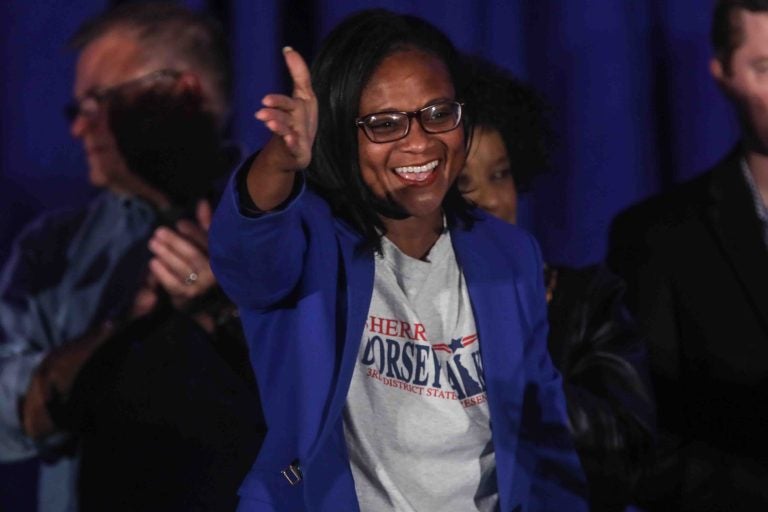Election brings more diversity to Delaware Legislature

Delaware state Rep.-elect Sherry Dorsey Walker greets supporters in 2018 at the Doubletree Hotel in Wilmington. (Saquan Stimpson for WHYY)
Tuesday’s election has made Delaware’s General Assembly a more diverse legislature.
In a state that’s 22 percent African-American, the number of black legislators has increased from four to eight — or 13 percent of the legislative seats.
“I think it’s encouraging we have people in the General Assembly who have an understanding of a lot of issues that exist in the community,” said state Rep.-elect Sherry Dorsey Walker, D-Wilmington.
“Having people of color and women, we know a little more about our community than someone else who hasn’t had the same experiences we have had,” she said.
In a year when 15 of 62 state lawmakers did not seek re-election, several African-American candidates took over recently vacated seats — including that of state Sen. Margaret Rose Henry, who was the second black senator after Herman Holloway.
State Sen. Darius Brown, D-Wilmington, is now the third, along with Elizabeth “Tizzy” Lockman, D-Wilmington.
“I think that sometimes progress may seem long, but I believe that we are making the progress in Delaware, and with that progress comes legislators that continue to advocate for those that have been underserved and those that have been underrepresented,” Brown said.
African-American state Rep. Charles Potter lost his bid for re-election during the primaries, and African- American state Rep. J.J. Johnson did not seek re-election. Now there are six black legislators in the House.
“I think it’s coming of age, it’s time, and with the current climate of politics, people are getting involved, they want to do something, they want to change the division within the country,” Johnson said. “You see a lot of women getting involved now, and that makes a difference too, that’s just as powerful as having African-Americans involved.”
State Rep. Kendra Johnson, D-Bear, said it has been her dream to hold political office since she was about 14 years old.
“I think it takes such courage to actually stand out and say, ‘I’m going to do this,’ ” she said.
“If we’re not stepping out and looking to have more of these types of roles, it doesn’t give individuals the opportunity to vote for us,” she said, adding that she imagined others followed her thought process in deciding to run: “OK, I’m going to step out on faith and follow my passion and what I believe God has for me, I’m going to just do it.”
As more women and African-Americans venture to run for election, she said, it gives Delaware residents an opportunity to vote for more diverse representation.
Expanding perspectives
Johnson said he can recall of a number of instances where being a black legislator made a difference in state policy. He recalls some of his colleagues did not understand why it was important for the state to issue an official apology for its role in slavery.
“They felt like, ‘That happened years ago, we weren’t responsible for slavery, and I didn’t own any slaves, and I don’t understand the concerns of the African American.’
“But being African-American and going through, not slavery, but Jim Crow and segregation, you understand just want it means to the community,” Johnson said.
When he spoke on the House floor about his own experiences in the ’60s when he washed dishes in a restaurant where he was not allowed to dine or endured racial slurs as he walked to school, his colleagues began to understand the importance of the issue, and gained insight on the issue.
During committee meetings and caucuses, engaging with legislators with a wide range of backgrounds gives lawmakers’ valuable insight, he said.
“The different members and their life experiences … you get a different perspective, and you say, ‘Oh, I never thought about it like that.’ It makes a difference,” Johnson said.
Johnson and Walker say added diversity will aid efforts toward improving the criminal justice system. Walker said she also plans to focus on the opioid addiction crisis with more opportunities for treatment as an alternative to the arrest.
“Once we start transforming the criminal justice system, we can look at job creation, because a lot of people are hindered as a result of things they may have done 20 years ago,” she said.
‘All voices will be heard’
The number of women in the legislature also increased from 13 to 15, with 10 now in the House. And women were elected as state treasurer and auditor, positions previously held by men.
“Delaware is echoing the concerns and sentiments of voters across our country,” said newly elected state Rep. Melissa Minor Brown, D-New Castle, who also is African-American. “Women make up more than half of the electorate, and now we’re seeing that play out on the political stage.
“This is a moment where all voices will be heard and represented, but we’re going to work along with our male colleagues so Delaware gets what it deserves, which is equal representation.”
House Majority Leader Valerie Longhurst, D-Bear, said it’s “about time” for increased diversity in Delaware’s House.
Longhurst predicts there will be more work on health care, education and environmental reform this session, particularly because some of the new female legislators have backgrounds in the legal and health care fields. She also hopes the Equal Rights Amendment legislation will receive enough votes to pass in its second go-around — the legislation amending the state Constitution to ensure equal rights for women requires votes two years in a row.
“I think with the Women’s March and #Me Too movement, women have decided to step up to the plate and make a difference. Before we stood back and critiqued why we should run for a position, and I think these ladies who won realized they can make an impact in Delaware, and the fact they ran great campaigns and put themselves forward inspires other women to run down the road,” Longhurst said.
“It’s great we have not only women but more diversity. I think that’s going to widen the conversation, and I think the General Assembly will be represented more fairly in the state of Delaware — it’s going to be a good year.”
WHYY is your source for fact-based, in-depth journalism and information. As a nonprofit organization, we rely on financial support from readers like you. Please give today.





